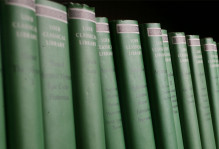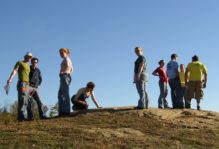My linguistic autobiography
I start all of my classes with a common assignment, the writing of a linguistic autobiography. I got the assignment from my advisor, William Labov who uses it in all of his classes (see http://www.ling.upenn.edu/~wlabov/HowIgot.html). The linguistic autobiography helps me to understand the linguistic histories of my students and since we can all communicate in some form, gives us some linguistic common ground. Students are never required to tell me any more than they want to. Some of the questions asked include:
Where are you from? Where have you lived? Who have you lived with?
Which of these social details do you think may have influenced the way you speak now? Are there other social details that you think are important/salient?
Is there a language you used to know as a small child that you don’t speak so well any more?
Do you remember particular comments or instances where your speech was commented on? Have you ever been praised for your Standardized English fluency?
I share my own linguistic autobiography with my students as a starting point. Here are some of the key parts of my linguistic story:
I am from one place: Varina, Virginia. My parents still live in a renovated version of the same house where they have lived my entire life. My favorite language use has always been–the varieties that my family speaks: the language spoken on the porches and pulpits in Charles City County, VA and Winston Salem, NC.
Thirteen years of prep school left me with a mastery of different language varieties than were found in and around the places where I grew up. At 18, I left Virginia to attend Harvard College, and after about a year or so I picked up some of the features of a New England and more standardized Northeastern ways of speaking. My graduate school years in Philadelphia gave me a more intimate knowledge of language as it is spoken in the inner cities of the Northeast. After my studies were over, I moved back to Virginia and I am re-adopting my native language variety, but I have found language patterns in Virginia have indeed changed in just the 12 years that I have been away.
But as any linguist will tell you, my linguistic story started way before me.
I am African-American from a tri-racial background. My parents are both physicians so most measures I would be classified as having an upper middle class upbringing. For me, growing up as an upper class African-American exposed racism in its purest form: race (and more specifically racism) matters, even when education and economic differences have been erased.
My maternal grandmother was at the top of her class at the Virginia Randolph School, but because segregation and cost limited her educational options, she was not able to go to college. Despite these limited options, she made the best of what she had, even practicing with me the French vocabulary that she still remembered from her high school days. But more importantly she gave me the gift of music. She could play anything she heard on the piano, and thus I was gifted with music as another way to communicate.
My paternal grandmother’s experiences contrast greatly with those of maternal grandmother, as she held master’s degrees in both English and History. My maternal grandmother taught me to read and had me reciting poetry and conversing on topics in African-American history at a very early age. Her annotated copy of Milton’s Paradise Lost and her early editions of the Harlem Renaissance poets serve me well in my capacity as an English Professor at the College.
This is not to leave my grandfathers out. My paternal grandfather left me with a strong appreciation for two forms of communication- rap and country music. He was truly the first person I heard rap – in the form of an old spiritual I heard him perform in church one day. It was pure magic. Every Saturday night we watched Hee-Haw and I’d sing along with the songs. His unique perspective left me with a wide linguistic and musical repertoire which is that of the American South.
My maternal grandfather died before I was born. He studied education at Howard University at the same time that Thurgood Marshall was there studying law. His legacy of a need to communicate about justice through education transcends death. In addition, co-author and good friend Christine is from the same small town in North Carolina as is my maternal grandfather. Maybe this connection explains our similar cultural temperaments that undoubtedly came from our North Carolina influenced upbringings. The legacy of our mothers, fathers, and families is in every word that we speak and on every page that we write.




No comments.
Comments are currently closed. Comments are closed on all posts older than one year, and for those in our archive.